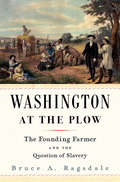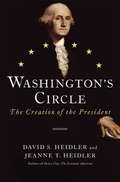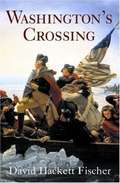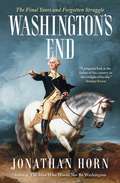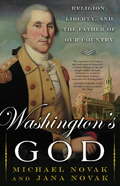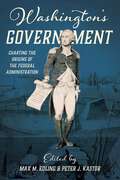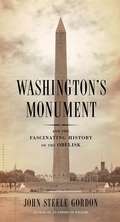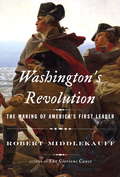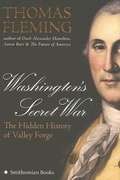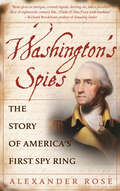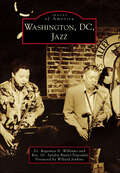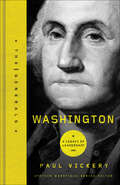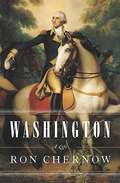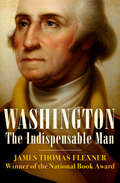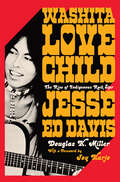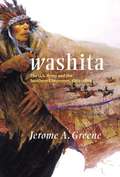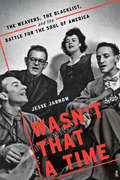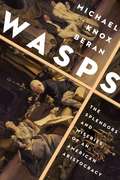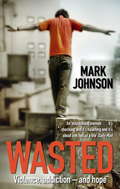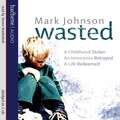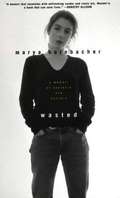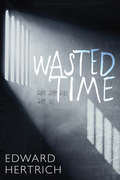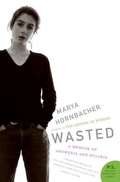- Table View
- List View
Washington at the Plow: The Founding Farmer and the Question of Slavery
by Bruce A. RagsdaleA fresh, original look at George Washington as an innovative land manager whose singular passion for farming would unexpectedly lead him to reject slavery. George Washington spent more of his working life farming than he did at war or in political office. For over forty years, he devoted himself to the improvement of agriculture, which he saw as the means by which the American people would attain the “respectability & importance which we ought to hold in the world.” Washington at the Plow depicts the “first farmer of America” as a leading practitioner of the New Husbandry, a transatlantic movement that spearheaded advancements in crop rotation. A tireless experimentalist, Washington pulled up his tobacco and switched to wheat production, leading the way for the rest of the country. He filled his library with the latest agricultural treatises and pioneered land-management techniques that he hoped would guide small farmers, strengthen agrarian society, and ensure the prosperity of the nation. Slavery was a key part of Washington’s pursuits. He saw enslaved field workers and artisans as means of agricultural development and tried repeatedly to adapt slave labor to new kinds of farming. To this end, he devised an original and exacting system of slave supervision. But Washington eventually found that forced labor could not achieve the productivity he desired. His inability to reconcile ideals of scientific farming and rural order with race-based slavery led him to reconsider the traditional foundations of the Virginia plantation. As Bruce Ragsdale shows, it was the inefficacy of chattel slavery, as much as moral revulsion at the practice, that informed Washington’s famous decision to free his slaves after his death.
Washington's Circle
by David S. Heidler Jeanne T. HeidlerHistory enthusiasts and admirers of Team of Rivals will rejoice in this magisterial account of the extraordinary Americans who served the nation's first chief executive: Together, they created the presidency for a country disgusted by crowns and the people who would wear them. In 1789, as George Washington became the first president of the United States, the world was all but certain that the American experiment in liberty and representative government would founder. More than a few Americans feared that the world was right. In Washington's Circle, we see how Washington and his trusted advisers, close friends, and devoted family defied the doomsayers to lay the foundation for an enduring constitutional republic. This is a fresh look at an aloof man whose service in the Revolutionary War had already earned him the acclaim of fellow citizens. Washington was easy to revere, if difficult to know. David S. Heidler and Jeanne T. Heidler reveal Washington's character through his relationship with his inner circle, showing how this unlikely group created the office of the presidency. Here is a story of cooperation, confrontation, triumph, and disappointment, as the president, Congress, and the courts sorted out the limits of executive power, quarreled over funding the government, coped with domestic strife, and faced a world at war while trying to keep their country at peace. Even more, it is a story of remarkable people striving for extraordinary achievements. Many of these characters are familiar as historic icons, but in these pages they act and speak as living individuals: the often irked and frequently irksome John Adams, in the vice presidency; the mercurial Alexander Hamilton, leading the Treasury Department; the brilliant, deceptively cunning Thomas Jefferson, as secretary of state; James Madison, who was Washington's advocate--and his eyes and ears--in Congress; and Washington's old friend and former brother-in-arms Henry Knox, at the administration's beleaguered War Department. Their stories mingle with those of Edmund Randolph, John Jay, Gouverneur Morris, and the others who stood with a self-educated Virginia farmer to forge the presidency into an institution protective of its privileges but respectful of congressional prerogatives. Written with energy, wit, and an eye for vivid detail, Washington's Circle is the fascinating account of the people who met the most formidable challenges of the government's earliest hours with pluck, ability, and enviable resourcefulness. When the world said they would fail, they rolled up their sleeves. This is their story.
Washington's Crossing
by David Hackett FischerSix months after the Declaration of Independence, the American Revolution was all but lost. A powerful British force had routed the Americans at New York, occupied three colonies, and advanced within sight of Philadelphia.<P><P> Yet, as David Hackett Fischer recounts in this riveting history, George Washington--and many other Americans--refused to let the Revolution die. On Christmas night, as a howling nor'easter struck the Delaware Valley, he led his men across the river and attacked the exhausted Hessian garrison at Trenton, killing or capturing nearly a thousand men. A second battle of Trenton followed within days. The Americans held off a counterattack by Lord Cornwallis's best troops, then were almost trapped by the British force. Under cover of night, Washington's men stole behind the enemy and struck them again, defeating a brigade at Princeton. The British were badly shaken. In twelve weeks of winter fighting, their army suffered severe damage, their hold on New Jersey was broken, and their strategy was ruined.<P> Fischer's richly textured narrative reveals the crucial role of contingency in these events. We see how the campaign unfolded in a sequence of difficult choices by many actors, from generals to civilians, on both sides. While British and German forces remained rigid and hierarchical, Americans evolved an open and flexible system that was fundamental to their success. The startling success of Washington and his compatriots not only saved the faltering American Revolution, but helped to give it new meaning.<P> Pulitzer Prize Winner
Washington's End: The Final Years and Forgotten Struggle
by Jonathan HornPopular historian and former White House speechwriter Jonathan Horn &“provides a captivating and enlightening look at George Washington&’s post-presidential life and the politically divided country that was part of his legacy&” (New York Journal of Books).Beginning where most biographies of George Washington leave off, Washington&’s End opens with the first president exiting office after eight years and entering what would become the most bewildering stage of his life. Embittered by partisan criticism and eager to return to his farm, Washington assumed a role for which there was no precedent at a time when the kings across the ocean yielded their crowns only upon losing their heads. In a different sense, Washington would lose his head, too. In this riveting read, bestselling author Jonathan Horn reveals that the quest to surrender power proved more difficult than Washington imagined and brought his life to an end he never expected. The statesman who had staked his legacy on withdrawing from public life would feud with his successors and find himself drawn back into military command. The patriarch who had dedicated his life to uniting his country would leave his name to a new capital city destined to become synonymous with political divisions. A &“movable feast of a book&” (Jay Winik, New York Times bestselling author of 1944), immaculately researched, and powerfully told through the eyes not only of Washington but also of his family members, friends, and foes, Washington&’s End is &“an outstanding biographical work on one of America&’s most prominent leaders (Library Journal).
Washington's God: Religion, Liberty, and the Father of Our Country
by Michael Novak JanaIn Washington’s God Michael Novak-one of America’s leading neoconservative pundits-and his daughter, Jana, uncover George Washington’s religious life. Finally the record is set straight on the most thoroughly misunderstood aspect of Washington’s life. The Novaks focus on Washington’s strong trust in divine Providence and see this belief as providing the unifying narrative to his monumental life.
Washington's Government: Charting the Origins of the Federal Administration (Early American Histories)
by Peter J. Kastor Max EdlingWashington’s Government shows how George Washington’s administration—the subject of remarkably little previous study—was both more dynamic and more uncertain than previously thought. Rather than simply following a blueprint laid out by the Constitution, Washington and his advisors constructed over time a series of possible mechanisms for doing the nation’s business. The results were successful in some cases, disastrous in others. Yet at the end of Washington’s second term, there was no denying that the federal government had achieved remarkable results. As Americans debate the nature of good national governance two and a half centuries after the founding, this volume’s insights appear timelier than ever.ContributorsLindsay M. Chervinsky, Iona College * Gautham Rao, American University * Kate Elizabeth Brown, Huntington University * Stephen J. Rockwell, St. Joseph’s College * Andrew J. B. Fagal, Princeton University, * Daniel Hulsebosch, New York University * Rosemarie Zagarri, George Mason University
Washington's Monument: And the Fascinating History of the Obelisk
by John Steele GordonThe colorful story behind one of America's greatest monuments and of the ancient obelisks of Egypt, now scattered around the world. Conceived soon after the American Revolution ended, the great monument to George Washington was not finally completed until almost a century later; the great obelisk was finished in 1884, and remains the tallest stone structure in the world at 555 feet. The story behind its construction is a largely untold and intriguing piece of American history, which acclaimed historian John Steele Gordon relates with verve, connecting it to the colorful saga of the ancient obelisks of Egypt. Nobody knows how many obelisks were crafted in ancient Egypt, or even exactly how they were created and erected since they are made out of hard granite and few known tools of the time were strong enough to work granite. Generally placed in pairs at the entrances to temples, they have in modern times been ingeniously transported around the world to Istanbul, Paris, London, New York, and many other locations. Their stories illuminate that of the Washington Monument, once again open to the public following earthquake damage, and offer a new appreciation for perhaps the most iconic memorial in the country.
Washington's Revolution
by Robert MiddlekauffA vivid, insightful, essential new account of the formative years that shaped a callow George Washington into an extraordinary leader, from the Bancroft Prize winner and Pulitzer Prize finalist Robert Middlekauff.George Washington was famously unknowable, a man of deep passions hidden behind a facade of rigid self-control. Yet before he was a great general and president, Washington was a young man prone to peevishness and a volcanic temper. His greatness as a leader evolved over time, the product of experience and maturity but also a willed effort to restrain his wilder impulses.Focusing on Washington's early years, Robert Middlekauff penetrates his mystique, revealing his all-too-human fears, values, and passions. Rich in psychological detail regarding Washington's temperament, idiosyncrasies, and experiences, this book shows a self-conscious Washington who grew in confidence and experience as a young soldier, businessman, and Virginia gentleman, and who was transformed into a patriot by the revolutionary ferment of the 1760s and '70s. Taking command of an army in constant dire need--of adequate food, weapons, and, at times, even clothing and shoes--Washington displayed incredible persistence and resourcefulness, growing into a leader who both understood and defined the crucial role of the army in the formation of a new American society.Middlekauff makes clear that Washington was at the heart of not just the revolution's course and outcome but also the success of the nation it produced. This is an indispensable book for truly understanding one of America's great figures.From the Hardcover edition.
Washington's Secret War: The Hidden History of Valley Forge
by Thomas FlemingThe secret war of the title was Washington's fight--while staving off the collapse of his army at Valley Forge--to identify and outmaneuver the political enemies who thought it was time to replace him with a more reliable and experienced general. Fleming, a longtime scholar of the Revolutionary War, thought he would be writing about the stubborn endurance of the American soldiers that winter. Instead he gleaned from his research a more personal story, revealing a new side of Washington--usually portrayed as a man who transcended politics: "He was a good politician in every sense of the word....He had to out think the conspirators who sought to destroy him and persuade others to out vote the congressional ideologues whose wrongheaded policies were the source of the Continental Army's woes." Annotation ©2006 Book News, Inc., Portland, OR (booknews.com)
Washington's Spies: The Story of America's First Spy Ring
by Alexander Rose<P>Basing his tale on remarkable original research, historian Alexander Rose reveals the unforgettable story of the spy ring that helped America win the Revolutionary War. For the first time, Rose takes us beyond the battlefront and into the shadowy underworld of double agents and triple crosses, covert operations and code breaking, and unmasks the courageous, flawed individuals who inhabited this wilderness of mirrors--including the spymaster at the heart of it all, George Washington. <P><b>A New York Times Bestseller</b>
Washington, DC, Jazz (Images of America)
by Regennia N. WilliamsWashington, DC, Jazz focuses, primarily, on the history of straight-ahead jazz, using oral histories, materials from the William P. Gottlieb Collection at the Library of Congress, the Felix E. Grant Jazz Archives at the University of the District of Columbia, and Smithsonian Jazz.Home to "Black Broadway" and the Howard Theatre in the Greater U Street area, Washington, DC, has long been associated with American jazz. Duke Ellington and Billy Eckstine launched their careers there in the early 20th century. Decades later, Shirley Horn and Buck Hill would follow their leads, and DC's "jazz millennials" include graduates of the Duke Ellington School of the Arts. For years, Bohemian Caverns and One Step Down were among the clubs serving as gathering places for producers and consumers of jazz, even as Rusty Hassan and other programmers used radio to promote the music. This volume also features the work of photographers Nathaniel Rhodes, Michael Wilderman, and Lawrence A. Randall.
Washington: A Legacy of Leadership (The Generals Series)
by Paul VickeryHis name is carved in granite, his likeness cast in bronze, his legend as large as the role he played as America's first president. But before he was a commander-in-chief, George Washington was a general in a revolution that would decide the future of the people and land he called his own. If victorious, he would gain immortality. If defeated, he would find his neck in a hangman's noose. Washington knew the sting of defeat?at Brandywine, at Germantown?yet this unwavering leadership and his vision for a new and independent nation emboldened an army prepared to fight barefoot if necessary to win that independence. Wrote an officer after the Battle of Princeton: "I saw him brave all the dangers of the field and his important life hanging as it were by a single hair with a thousand deaths flying around him." Among America's pantheon of Founding Fathers, one man?to this day?stands out. Author Paul Vickery tracks the unlikely rise of Washington, a man whose stature in command of a young army became prelude to a presidency. As Vickery writes, "He learned to become the father of our country by first being the father of our military."
Washington: A Life (Playaway Adult Nonfiction Ser.)
by Ron ChernowIn Washington: A Life celebrated biographer Ron Chernow provides a richly nuanced portrait of the father of our nation. With a breadth and depth matched by no other one-volume life of Washington, this crisply paced narrative carries the reader through his troubled boyhood, his precocious feats in the French and Indian War, his creation of Mount Vernon, his heroic exploits with the Continental Army, his presiding over the Constitutional Convention, and his magnificent performance as America's first president.<P><P> Despite the reverence his name inspires, Washington remains a lifeless waxwork for many Americans, worthy but dull. A laconic man of granite self-control, he often arouses more respect than affection. In this groundbreaking work, based on massive research, Chernow dashes forever the stereotype of a stolid, unemotional man. A strapping six feet, Washington was a celebrated horseman, elegant dancer, and tireless hunter, with a fiercely guarded emotional life. Chernow brings to vivid life a dashing, passionate man of fiery opinions and many moods. Probing his private life, he explores his fraught relationship with his crusty mother, his youthful infatuation with the married Sally Fairfax, and his often conflicted feelings toward his adopted children and grandchildren. He also provides a lavishly detailed portrait of his marriage to Martha and his complex behavior as a slave master.<P> At the same time, Washington is an astute and surprising portrait of a canny political genius who knew how to inspire people. Not only did Washington gather around himself the foremost figures of the age, including James Madison, Alexander Hamilton, John Adams, and Thomas Jefferson, but he also brilliantly orchestrated their actions to shape the new federal government, define the separation of powers, and establish the office of the presidency.<P> In this unique biography, Ron Chernow takes us on a page-turning journey through all the formative events of America's founding. With a dramatic sweep worthy of its giant subject, Washington is a magisterial work from one of our most elegant storytellers.<P> Pulitzer Prize Winner
Washington: The Indispensable Man (The\illustrated Editions Ser.)
by James Thomas FlexnerThis &“perceptive&” and &“satisfying&” biography of George Washington by an award-winning historian &“deserves a place on every American&’s bookshelf&” (The New York Times Book Review). James Thomas Flexner&’s masterful four-volume biography of America&’s first president, which received a special Pulitzer Prize citation and a National Book Award for its concluding installment, is the definitive chronicle of Washington&’s life and a classic work of American history. In this single-volume edition, Flexner brilliantly distills his sweeping study to offer readers &“the most convincing evocation of the man and his deeds written within the compass of one book&” (Los Angeles Times). In graceful and dramatic prose, Flexner peels back the myths surrounding Washington to reveal the true complexity of his character. The only founding father from Virginia to free all his slaves, Washington was a faithful husband who harbored deep romantic feelings for his best friend&’s wife. An amateur soldier, he prepared for his role as commander in chief of the Continental army by sending out to Philadelphia bookshops for treatises on military strategy. As president, he set many democratic precedents—including the two-term limit and the appointment of an advisory cabinet—yet routinely excluded his vice president, John Adams, from important decisions. The George Washington that emerges in these pages is a shrewd statesman, a wise commander, a brave patriot, and above all, &“an ordinary man pushed to greatness by the extraordinary times in which he lived&” (The Christian Science Monitor). In tracing Washington&’s evolution from privileged son of the landed gentry to &“the indispensable man&” without whom the United States as we know it would not exist, Flexner presents a hero worthy of admiration not only for his remarkable strengths, but also for his all-too-human weaknesses.
Washita Love Child: The Rise of Indigenous Rock Star Jesse Ed Davis
by Douglas K. Miller“I first met Jesse Ed Davis in the late ’80s. . . . [He was a] gentle yet intensely present giant who was a legend of an artist. . . . In Washita Love Child, Jesse Ed Davis is resurrected in story.” —Joy Harjo, from the foreword No one played like Jesse Ed Davis. One of the most sought-after guitarists of the late 1960s and ’70s, Davis appeared alongside the era’s greatest stars—John Lennon and Mick Jagger, B.B. King and Bob Dylan—and contributed to dozens of major releases, including numerous top-ten albums and singles, and records by artists as distinct as Johnny Cash, Taj Mahal, and Cher. But Davis, whose name has nearly disappeared from the annals of rock and roll history, was more than just the most versatile session guitarist of the decade. A multitalented musician who paired bright flourishes with soulful melodies, Davis transformed our idea of what rock music could be and, crucially, who could make it. At a time when few other Indigenous artists appeared on concert stages, radio waves, or record store walls, in a century often depicted as a period of decline for Native Americans, Davis and his Kiowa, Comanche, Cheyenne, Seminole, and Mvskoke relatives demonstrated new possibilities for Native people. Weaving together more than a hundred interviews with Davis’s bandmates, family members, friends, and peers—among them Jackson Browne, Bonnie Raitt, and Robbie Robertson—Washita Love Child powerfully reconstructs Davis’s extraordinary life and career, taking us from his childhood in Oklahoma to his first major gig backing rockabilly star Conway Twitty, and from his dramatic performance at George Harrison’s 1971 Concert for Bangladesh to his years with John Trudell and the Grafitti Man band. In Davis’s story, a post-Beatles Lennon especially emerges as a kindred soul and creative partner. Yet Davis never fully recovered from Lennon’s sudden passing, meeting his own tragic demise just eight years later. With a foreword by former poet laureate Joy Harjo, who collaborated with Davis near the end of his life, Washita Love Child thoroughly and finally restores the “red dirt boogie brother” to his rightful place in rock history, cementing his legacy for generations to come.
Washita: The U.S. Army and the Southern Cheyennes, 1867-1869
by Jerome A. GreeneOn November 27, 1868, the U.S. Seventh Cavalry under Lt. Col. George Armstrong Custer attacked a Southern Cheyenne village along the Washita River in present-day western Oklahoma. In this remarkably balanced history, Greene describes the event's causes, conduct, and consequences and the multiple controversies surrounding the conflict.
Wasn't That a Time: The Weavers, the Blacklist, and the Battle for the Soul of America
by Jesse JarnowThe dramatic untold story of the Weavers, the hit-making folk-pop quartet destroyed with the aid of the United States government--and who changed the world, anyway Following a series of top-ten hits that became instant American standards, the Weavers dissolved at the height of their fame. Wasn't That a Time: The Weavers, the Blacklist, and the Battle for the Soul of America details the remarkable rise of Pete Seeger's unlikely band of folk heroes, from basement hootenannies to the top of the charts, and the harassment campaign that brought them down. Exploring how a pop group's harmonies might be heard as a threat worthy of decades of investigation by the FBI, Wasn't That a Time turns the black-and-white 1950s into vivid color, using the Weavers to illuminate a dark and complex period of American history. With origins in the radical folk collective the Almanac Singers and the ambitious People's Songs, the singing activists in the Weavers set out to change the world with songs as their weapons, pioneering the use of music as a transformative political organizing tool. Using previously unseen journals and letters, unreleased recordings, once-secret government documents, and other archival research, Jesse Jarnow uncovers the immense hopes, incredible pressures, and daily struggles of the four distinct and often unharmonious personalities at the heart of the Weavers.In an era defined by a sharp political divide that feels all too familiar, the Weavers became heroes. With a class- and race-conscious global vision that now makes them seem like time travelers from the twenty-first century, the Weavers became a direct influence on a generation of musicians and listeners, teaching the power of eclectic songs and joyous, participatory harmonies.
Wasps: The Splendors and Miseries of an American Aristocracy
by Michael Knox BeranAn examination of WASP culture through the lives of some of its most prominent figures. Envied and lampooned, misunderstood and yet distinctly American, WASPs are as much a culture, socioeconomic and ethnic designation, and state of mind.Charming, witty, and vigorously researced, WASPS traces the rise and fall of this distinctly American phenomenon through the lives of prominent icons from Henry Adams and Theodore Roosevelt to George Santayana and John Jay Chapman. Throughout this dynamic story, Beran chronicles the efforts of WASPs to better the world around them as well as the struggles of these WASPs to break free from their restrictive culture. The death of George H. W. Bush brought about reflections on the end of patrician WASP culture, where privilege reigned, but so did a genuine desire to use that privilege for public service. In the time of Trump—who is the antithesis of true WASP culture—people look at the John Kerry, Bobby Kennedy, and Philip and Kay Grahams of the world with wistfulness. And even though we are a more diverse and pluralistic nation now than ever before, there is something about WASP culture that remains enduringly aspirational and fascinating. Beginning at the turn of the 20th century, Beran&’s saga dramatizes the evolving American aristocracy that forever changed a nation—and what we can still glean from WASP culture as we enter a new era.
Wasted
by Mark JohnsonMark Johnson's father had 'LOVE' tattooed across his left hand, but that didn't stop the beatings. The Johnson children would turn up to school with broken fingers and chipped teeth, but no one ever thought of investigating their home life. Mark just slipped through the cracks, and kept on falling. For years. Constantly in trouble at school, Mark began stealing at the age of seven, was drinking by the age of eight, and took his first hit of heroin aged eleven. A sensitive, intelligent boy, he could never stay on the right path, and though Art College beckoned, he ended up in Portland prison instead. With searing honesty, WASTED documents Mark's descent into the depths of addiction and criminality. Homeless, hooked on heroin and crack, no one - least of all Mark - believed he would survive. And yet - astonishingly - he somehow pulled himself through, and now runs his own thriving tree surgery business, employing and helping other recovering addicts. His story is at once shocking and inspiring - a compelling account of his struggle to save himself, and help save others in the process.
Wasted
by Mark JohnsonMark Johnson's father had 'LOVE' tattooed across his left hand, but that didn't stop the beatings. The Johnson children would turn up to school with broken fingers and chipped teeth, but no one ever thought of investigating their home life. Mark just slipped through the cracks, and kept on falling. For years. Constantly in trouble at school, Mark began stealing at the age of seven, was drinking by the age of eight, and took his first hit of heroin aged eleven. A sensitive, intelligent boy, he could never stay on the right path, and though Art College beckoned, he ended up in Portland prison instead. With searing honesty, WASTED documents Mark's descent into the depths of addiction and criminality. Homeless, hooked on heroin and crack, no one - least of all Mark - believed he would survive. And yet - astonishingly - he somehow pulled himself through, and now runs his own thriving tree surgery business, employing and helping other recovering addicts. His story is at once shocking and inspiring - a compelling account of his struggle to save himself, and help save others in the process.
Wasted
by Mark JohnsonMark Johnson's father had 'LOVE' tattooed across his left hand, but that didn't stop the beatings. The Johnson children would turn up to school with broken fingers and chipped teeth, but no one ever thought of investigating their home life. Mark just slipped through the cracks, and kept on falling. For years. Constantly in trouble at school, Mark began stealing at the age of seven, was drinking by the age of eight, and took his first hit of heroin aged eleven. A sensitive, intelligent boy, he could never stay on the right path, and though Art College beckoned, he ended up in Portland prison instead. With searing honesty, WASTED documents Mark's descent into the depths of addiction and criminality. Homeless, hooked on heroin and crack, no one - least of all Mark - believed he would survive. And yet - astonishingly - he somehow pulled himself through, and now runs his own thriving tree surgery business, employing and helping other recovering addicts. His story is at once shocking and inspiring - a compelling account of one man's struggle to save himself, and help save others in the process.
Wasted
by Marya HornbacherWhy would a talented young woman enter into a torrid affair with hunger, drugs, sex, and death? Through five lengthy hospital stays, endless therapy, and the loss of family, friends, jobs, and all sense of what it means to be "normal," Marya Hornbacher lovingly embraced her anorexia and bulimia -- until a particularly horrifying bout with the disease in college put the romance of wasting away to rest forever. A vivid, honest, and emotionally wrenching memoir, Wasted is the story of one woman's travels to reality's darker side -- and her decision to find her way back on her own terms.
Wasted Time
by Edward HertrichA stark and honest memoir of thirty-five years spent in Canada’s prison system. Born and raised in Toronto’s Regent Park, Edward Hertrich left high school in grade eleven to start working. A year later, he started dealing drugs in earnest, beginning a criminal career that resulted in him being incarcerated for thirty-five of his next forty years. In Wasted Time, Hertrich describes his time behind bars. Once considered a serious threat to public safety, he spent much of his time at Millhaven Institution, a maximum-security prison that housed four hundred of Canada’s most dangerous inmates, including murderers, bank robbers, and gang members, as well as — for most of his stay there — a gang of sadistic guards.
Wasted: A Memoir of Anorexia and Bulimia
by Marya HornbacherWhy would a talented young woman enter into a torrid affair with hunger, drugs, sex, and death? Through five lengthy hospital stays, endless therapy, and the loss of family, friends, jobs, and all sense of what it means to be "normal," Marya Hornbacher lovingly embraced her anorexia and bulimia -- until a particularly horrifying bout with the disease in college put the romance of wasting away to rest forever. A vivid, honest, and emotionally wrenching memoir, Wasted is the story of one woman's travels to reality's darker side -- and her decision to find her way back on her own terms.
